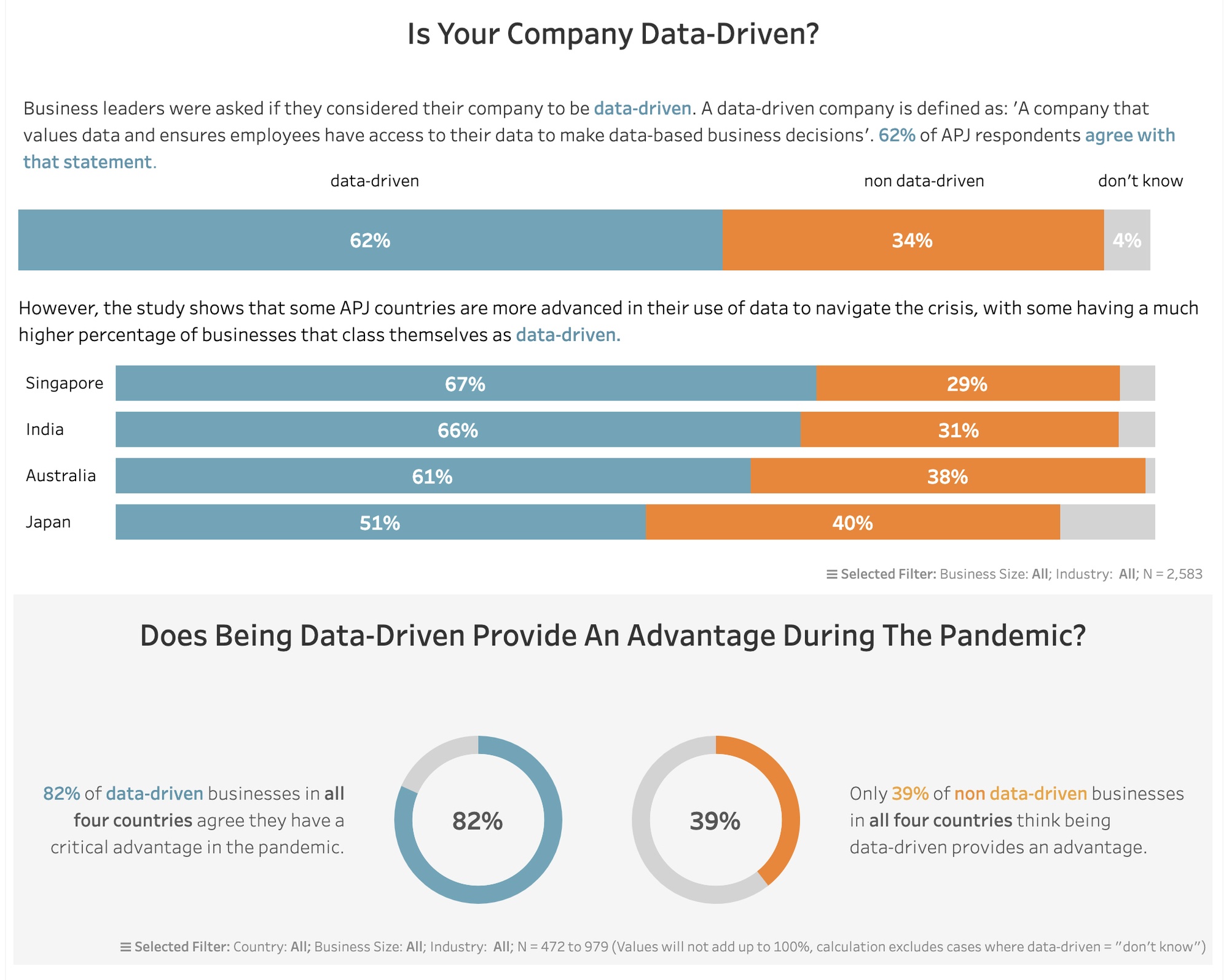One year after the COVID-19 pandemic began, recovery is uneven across the Asia-Pacific region. Many businesses are uncertain about the future and the challenges it might bring.
But there are business leaders who feel optimistic about the next six months, in spite of the uncertainties ahead. These are the leaders of data-driven organisations. In data-driven organisations, leaders value data and ensure employees have access to the data needed to make business decisions.
Data-driven companies are more optimistic
More data-driven companies (63%) are optimistic about the future health of their business in the next six months than non data-driven companies (37%).
This is the most notable finding we uncovered in a recent study conducted in conjunction with YouGov. We surveyed more than 2,500 managers and IT decision makers. Our focus was on four markets in the Asia-Pacific region: Singapore, Australia, India, and Japan.
We asked business leaders across various industries about their use of data during the pandemic, lessons learnt, and confidence in the future health of their organisations. Overwhelmingly, we found that data-driven organisations are more resilient and confident during the pandemic. Eighty-two percent of data-driven companies have reported critical business advantages during the pandemic. Business leaders experienced these benefits:
- Being able to make strategic business decisions faster (54%)
- More effective communication with stakeholders (54%)
- Increased cross-team collaboration (51%)
- Making their business more agile (46%)
Bank Mandiri, one of the leading financial institutions in Indonesia, is a great example of a data-driven organisation.
At the height of the pandemic, when many of its customers faced cash flow problems, the bank turned to its data. It tapped into data sources, built data squads, and created key dashboards focused on real-time liquidity monitoring and a law restructuring programme. All within 48 hours. A Tableau solution allowed Bank Mandiri to increase flexibility in their operations, and assess customers’ suitability for their new loan restructuring program. Customers could still carry out their financial transactions and receive support with their financial and loan repayment needs.
What is troubling is that across the region, there remains a disconnect in how businesses value and use data. Only 39% of non data-driven companies recognise data as a critical advantage. But, as the pandemic has shown, a strong data culture is no longer a nice-to-have. It has become a must-have for organisations.

Explore the full dashboard here.
Investment in data skills key to gaining competitive advantage
One of the fundamental areas of focus for organisations during the pandemic is retaining and investing in their people. On this front, data-driven companies are again leading the charge. Eighty-two percent of them are eager to increase or continue their existing level of data skills investment in employees over the next six months.
Worryingly, 32 percent of non data-driven organisations have opted to either reduce or not invest in data skills at all. These non data-driven companies are at high risk of being at a disadvantage. Without the requisite skills, it is hard for employees to make data-informed strategic and tactical decisions.
Zuellig Pharma, one of the largest healthcare service providers in the region, is deeply committed to investing in data skills training. The company has Tableau and automation training, as well as self-directed learning on its online Academy. These efforts have paid off well during the pandemic.
At Zuellig Pharma, even ground level staff such as warehouse operators demonstrate data competency. They can review and analyse data using Tableau and understand how warehouse processes map against business goals. An empowered workforce gives the organisation more confidence in planning, preparing, and overcoming new operational challenges brought about by the pandemic.
Start building business resilience with data analytics now
Economic recovery remains uneven and there is much uncertainty across the region. It is more important than ever for business leaders to build operational resilience and business agility with data insights.
Actually, becoming a data-driven organisation does not require dramatic changes right off the bat. Business leaders can start with data that already sits within their organisations. They can also empower their employees with the necessary data skills and tools. Over time, business leaders can work towards building communities centred around making data-first decisions.
Look to data-driven organisations like ZALORA for inspiration on how to drive organisational transformation with data. Data enabled ZALORA to diversify its product offerings and unlock new revenue streams, even amidst the pandemic. In 2020, it introduced TRENDER, an embedded analytics solution, which gives brand partners on its platform real-time insights and trends on sales performance. That’s how ZALORA stayed relevant and competitive in the retail scene.
Find out more about our YouGov research and how to get started on your data journey here.
Another version of this post appeared on the Tableau blog.

























